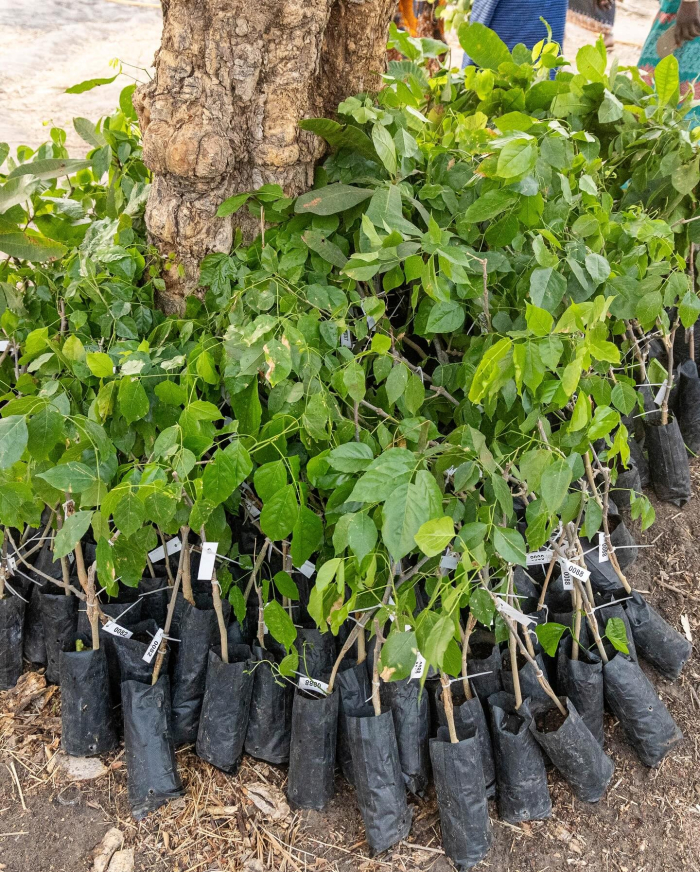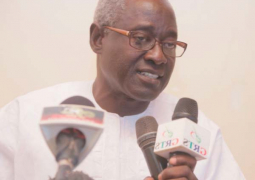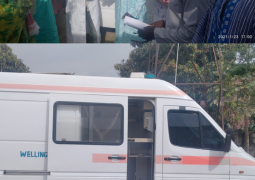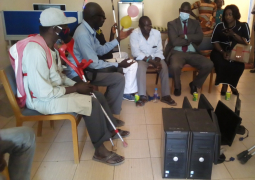
The high-end project is centred into with the University of Bradford to develop marketable bio-compounds for cosmetics and superfood products derived from pongamia (oil tree) plant.
However, the project in the next three years is expected to scale to 10,000 hectares across the region, creating jobs, restoring ecosystems, and fueling change — literally and figuratively. The day’s programme was graced by cabinet ministers, the Regional Governor of North Bank – Lamin Saidy Khan, GiEPA CEO – Ousainou Senghore, Regenerative Hubs representative – Jaha Dukureh, representative of Giants of Africa among a cross section of the community of CRR.
At the event, Haruna Cham, Nianija District Sport Association and Awa Bah, former lady Councilor in the area, both hailed the project as first of its kind in the country, noting that the project would greatly transform and enhance the livelihoods of people especially women and youth in the area.
Dawda Bah, Chief of Nianija, enjoined the people in the area to embrace unity and work towards the development of the project.
Chief Bah spoke highly of the project and the transformative impact it would have on the people in the area and beyond.
Amadou Camara, National Assembly Member for Nianija and Ousman Bah, Governor of the Central River Region, both lauded GIEPA and partners Giants of Africa for bring such a transformative project to the area.
The project, he said, would not only create job for the community but other gainful ventures for the community, thus calling on all to support this laudable initiative.
Jaka Dukureh, a representative of Regenerative Hub, described the project as not just a project;
“This is about more than planting trees. It’s about planting hope — in the form of skills, opportunity, and dignity. It’s about creating real pathways to uplift women out of poverty and building systems that work for our people, not just around them., but as a vision born from purpose and grown through community.”
The Gambian activist pointed out that on this 1,750-hectare pilot site, they’re growing feedstock that will produce biofuel — using crops that regenerate ‘our land and power our future.’
This, she added, is just the beginning noting that over the next three years, they plan to scale to 10,000 hectares across the region, creating jobs, restoring ecosystems, and fueling change — literally and figuratively.
Ousainou Senghore, Chief Executive Officer of GIEPA, underscored the importance of the project and the impact it would have on the host communities.
CEO Senghore explained that the agro-forestry project would not only create jobs but would also position the country as a hub when it comes to bio-fuel production.
Baboucar Ismaila Joof, minister of Trade, Industry, Regional Integration and Employment, spoke highly of the project transformative projects since the new government took over in 2017, especially in modernising and revitalizing agriculture in the country.
In his launch statement, Hamat Bah, minister of Lands and Regional Government, on behalf of the minister of Agriculture, extended heartfelt gratitude to all partners and stakeholders, who have work so tirelessly to bring this innovative project to life.
The project, he said, directly fits into aspiration enshrine into the country’s National Development Plan particularly its strategic priorities areas of commercializing agriculture, promoting economic diversification and job creation as well as building resilience to climate change.
Minister Bah maintained that the project also represents a bold and forward-thinking step towards leveraging nature-based solution for energy production, land rehabilitation and livelihood creation.
“The potential of Pongamia oil as a bio fuel not only contribute to our national efforts to renewable energy transition, but also position The Gambia as a regional innovator to climate smart agriculture.”
He added; “More importantly, the project, also provides a strategic opportunity to help rural communities especially youth and women through meaningful employment, capacity building and access to viable agriculture valued-chain.”
Lands Minister noted that the ministry is cognizance of the fact that for agriculture to be truly transformative, it must move away from subsistence to knowledge-driven technology to enable environmentally sustainable and market oriented.
“This, initiative exemplifies a paradigm shift where innovation and private sector engagement and environmental stewardship converge for national progress. As we gathered here today, we are not only merely planting trees, we are planting a vision for greener economy of resilience community of reduce dependency on imported fossil fuel and a future where agriculture is at the forefront of national development.”





